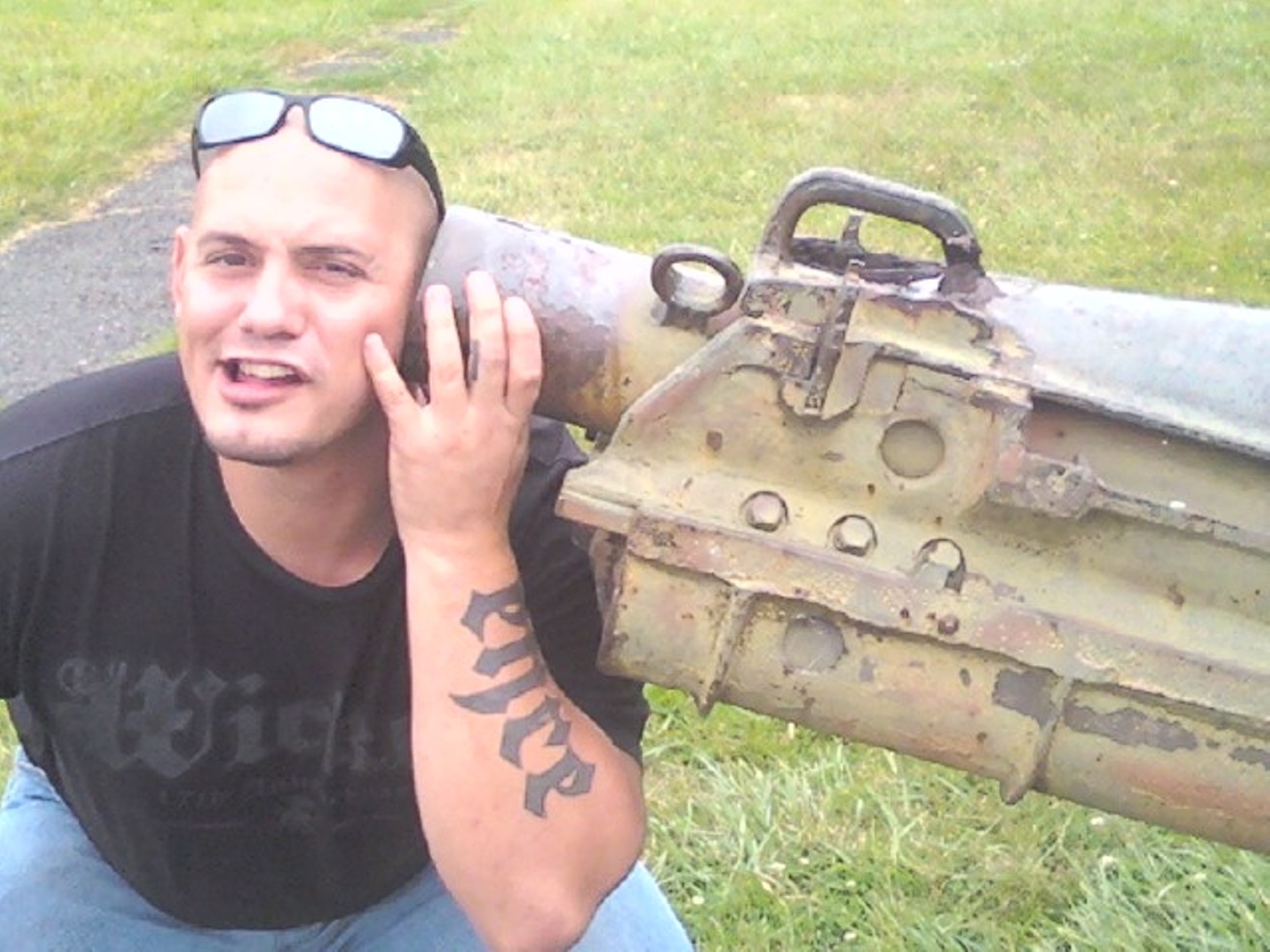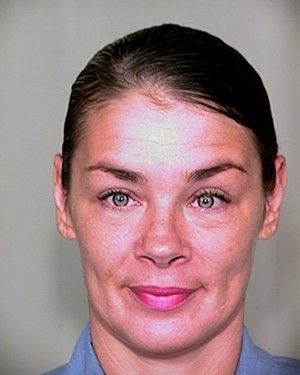As Ricci, 37, stood before Maricopa County Superior Court Judge Dean M. Fink in leg irons, handcuffs, and orange jail duds, with the tattooed words “white” and “pride” visible on the back of his upper arms, Fink acknowledged that Ricci was both “intelligent and charismatic” as well as “violent and cold-blooded.”
“You have a lot of potential,” Fink said to Ricci, explaining that he could foresee Ricci changing himself into someone who could “help people.”
But the judge said he also could envision Ricci becoming “the leader of the Aryan Brotherhood,” the sinister, all-white prison gang known for organized crime, drug-running, and contract killing.“He has his mom,” Shlee said of Ricci. “Don’t let him have his freedom.”
tweet this
The latter prediction sounds more likely. The Arizona Department of Corrections suspects that Ricci, a lifelong racist skinhead, has joined the Aryan Brotherhood in prison. Prior to the recent sentencing, Ricci already was serving a 22-year sentence for a 2011 conviction related to a savage knife attack, where he stabbed two men coming to the aid of his girlfriend after Ricci shoved her head into a wall.
A jury convicted Ricci in early January of first-degree murder in the shooting of Jaeger.
On March 7, the same all-white jury spared Ricci a date with the needle, deciding on a punishment of life in prison for Jaeger’s slaying, instead of the death penalty. Under Arizona law, it was Fink’s call whether to sentence Ricci to prison with the possibility of parole after a 25-year stint, or to natural life, which entails no opportunity for release of any kind.
Ricci endured a “bad childhood,” Fink conceded at one point, including physical and sexual abuse – facts the defense successfully exploited to allow Ricci to avoid the executioner. However, Fink continued, this did not excuse Ricci’s “horrible” and “senseless” crime.
Indeed, Jaeger’s murder is one of Phoenix’s most egregious hate crimes of recent memory.
On the night of October 3, 2009, two days before her 40th birthday, Jaeger, who is Caucasian, was walking in the area of Palma Park in Phoenix’s Sunnyslope neighborhood with her African-American boyfriend, Jeffery Wellmaker, when Ricci emerged from the darkness, shirtless and drunk, yelling, “Hey, nigger, what are you doing with that white woman?”
Wellmaker wanted to fight Ricci, whom a witness to the conflict later described as looking like a “white Mike Tyson,” but Jaeger pulled Wellmaker away as Ricci followed them, shouting racial epithets and slogans such as, “This is white power!”
At some point, Ricci abandoned the couple, returning to the house he was staying at, where a group of racist skinheads had been partying. He grabbed a 12-gauge Mossberg shotgun belonging to his accomplice, fellow neo-Nazi Aaron Levi Schmidt, and the two men drove off in a white sedan on the hunt for Wellmaker, their intended target.
They passed Wellmaker and Jaeger on a desolate stretch of road, near Puget Avenue and Seventh Street. Schmidt, the driver, doubled back and slowed down as they approached the pair, while Ricci unloaded both barrels, missing Wellmaker, but striking down Jaeger, who died of her wounds, bleeding out in the moonlight as she lay on the gravel next to a payphone.
Fink told Ricci that two scenes from the immediate aftermath of the shooting were burned into his mind.
Ricci’s fellow racist skinheads testified at trial that they had buried the shotgun shells, moved their cars around to hide the murder vehicle, and turned off lights in the house to evade the police. That was the first.
The second was of Wellmaker when the police responded to his 911 call for help and found him “holding Ms. Jaeger,” wailing as he urged her to “wake up.”
In addition to imposing natural life on Ricci, Fink recognized “the emotional harm done to Mr. Wellmaker” and to the “multiple victims” in the case, including Jaeger’s family, by setting the punishments in some of the other seven guilty verdicts to run consecutively. Fink noted that this was more than symbolic, in case any of the verdicts are reversed on appeal.
Earlier, Fink heard testimony from Jaeger’s daughter, Lauren Shlee, who was in the audience with Jaeger’s father, retired New York City policeman Charles Jaeger. Fink also heard from Ricci himself, and from former Phoenix Police Detective John Justus, the man largely responsible for bringing Ricci to justice.
Tearfully, Shlee, 23, told Fink that her whole life had been negatively affected by Ricci’s brutal crime, though she overcame tragedy and hardship to graduate from college in California.
“He has his mom,” Shlee said of Ricci. “Don’t let him have his freedom.”
As a onetime member of the Phoenix Police Department’s elite (now defunct) Career Criminal Squad (CCS), Justus helped bring down several members of the vicious, white supremacist gang that Ricci had been a member of at the time of the Jaeger homicide: the Vinlanders Social Club, a criminal organization that is connected to several murders and aggravated assaults in Arizona and other states.
The CCS relied on a unique partnership with a legendary Southwest regional investigator for the ADL of Arizona, who provided crucial intelligence to the CCS and whose name must remain confidential as a result. Justus told the court that he had worked with the CCS for eight of his 17 years on the force and had been shot three times in the line of duty. In his opinion, Ricci was incorrigible.
“I’ve seen no remorse for any of his crimes,” Justus said. “He is still living the gangster/thug life in prison as a member of the AB.”
By contrast, Ricci’s statement to the judge was self-centered and tone-deaf. Clearly peeved, he griped that prosecutors had referred to him during the trial as being 5 feet and 6 inches tall, and therefore “short.” He admitted to having a “Napoleon complex,” with a “tendency to take violence to the next level.”
He also bragged about staying out of prison for one three-and-a-half year stretch during his life of crime, saying he put his “best foot forward” at the time, but that it wasn’t good enough for society. He also acknowledged Shlee’s presence, claiming he “felt her pain and understood her loss.”
Yet, he would rather be in her shoes at the moment, he said, because, though his own mother was alive, she was not as loving as Shlee’s mom had been to her.
It was an odd assertion, given that his mother, a former drug addict, testified on his behalf during the penalty phase and was in court on Friday, her face sunk in her hands for almost the entirety of the hearing.
Ricci’s narcissism did not help his cause. It also echoed Deputy Maricopa County Attorney Ryan Green’s characterization of Ricci at the hearing.
Green noted the racist nature of the shooting and fought back against the defense’s notion that the beatings Ricci endured from his father growing up somehow absolved the neo-Nazi of his fiendish deeds.
“There are other people who have endured hardship,” said Green.
Referring to Ricci’s victims, he concluded:
“Their pain matters, too … They deserve peace, and they deserve closure.”













